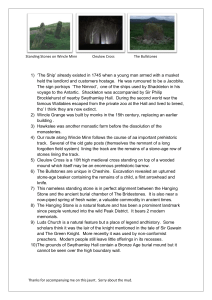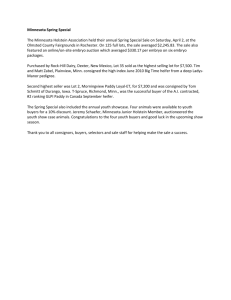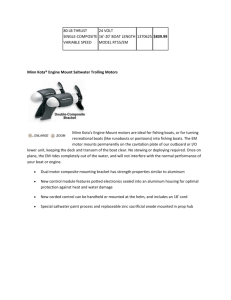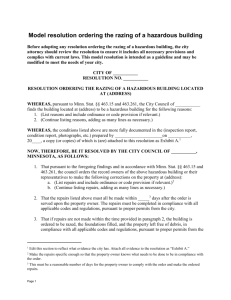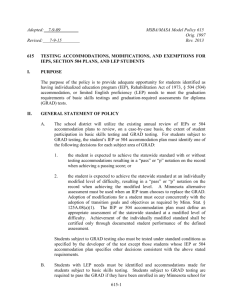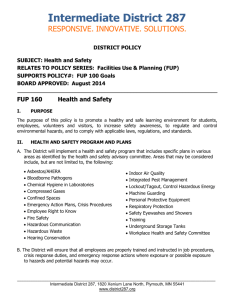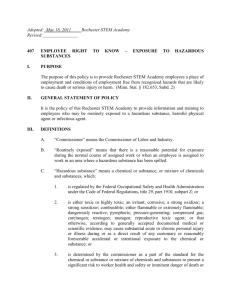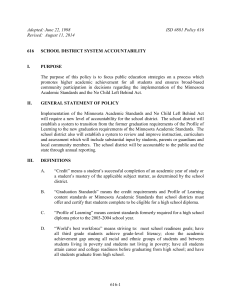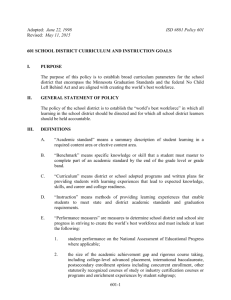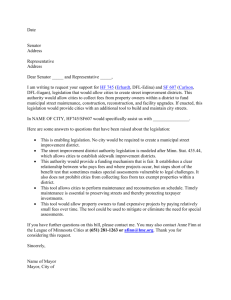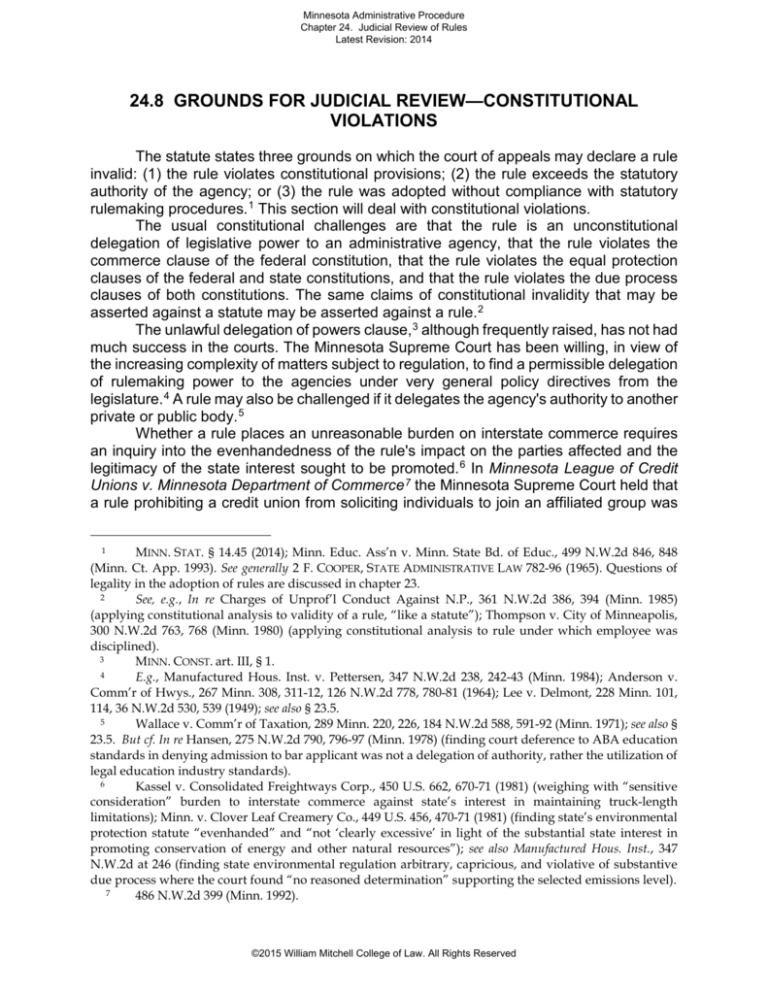
Minnesota Administrative Procedure
Chapter 24. Judicial Review of Rules
Latest Revision: 2014
24.8 GROUNDS FOR JUDICIAL REVIEW—CONSTITUTIONAL
VIOLATIONS
The statute states three grounds on which the court of appeals may declare a rule
invalid: (1) the rule violates constitutional provisions; (2) the rule exceeds the statutory
authority of the agency; or (3) the rule was adopted without compliance with statutory
rulemaking procedures. 1 This section will deal with constitutional violations.
The usual constitutional challenges are that the rule is an unconstitutional
delegation of legislative power to an administrative agency, that the rule violates the
commerce clause of the federal constitution, that the rule violates the equal protection
clauses of the federal and state constitutions, and that the rule violates the due process
clauses of both constitutions. The same claims of constitutional invalidity that may be
asserted against a statute may be asserted against a rule. 2
The unlawful delegation of powers clause, 3 although frequently raised, has not had
much success in the courts. The Minnesota Supreme Court has been willing, in view of
the increasing complexity of matters subject to regulation, to find a permissible delegation
of rulemaking power to the agencies under very general policy directives from the
legislature. 4 A rule may also be challenged if it delegates the agency's authority to another
private or public body. 5
Whether a rule places an unreasonable burden on interstate commerce requires
an inquiry into the evenhandedness of the rule's impact on the parties affected and the
legitimacy of the state interest sought to be promoted. 6 In Minnesota League of Credit
Unions v. Minnesota Department of Commerce 7 the Minnesota Supreme Court held that
a rule prohibiting a credit union from soliciting individuals to join an affiliated group was
MINN. STAT. § 14.45 (2014); Minn. Educ. Ass’n v. Minn. State Bd. of Educ., 499 N.W.2d 846, 848
(Minn. Ct. App. 1993). See generally 2 F. COOPER, STATE ADMINISTRATIVE LAW 782-96 (1965). Questions of
legality in the adoption of rules are discussed in chapter 23.
2
See, e.g., In re Charges of Unprof’l Conduct Against N.P., 361 N.W.2d 386, 394 (Minn. 1985)
(applying constitutional analysis to validity of a rule, “like a statute”); Thompson v. City of Minneapolis,
300 N.W.2d 763, 768 (Minn. 1980) (applying constitutional analysis to rule under which employee was
disciplined).
3
MINN. CONST. art. III, § 1.
4
E.g., Manufactured Hous. Inst. v. Pettersen, 347 N.W.2d 238, 242-43 (Minn. 1984); Anderson v.
Comm’r of Hwys., 267 Minn. 308, 311-12, 126 N.W.2d 778, 780-81 (1964); Lee v. Delmont, 228 Minn. 101,
114, 36 N.W.2d 530, 539 (1949); see also § 23.5.
5
Wallace v. Comm’r of Taxation, 289 Minn. 220, 226, 184 N.W.2d 588, 591-92 (Minn. 1971); see also §
23.5. But cf. In re Hansen, 275 N.W.2d 790, 796-97 (Minn. 1978) (finding court deference to ABA education
standards in denying admission to bar applicant was not a delegation of authority, rather the utilization of
legal education industry standards).
6
Kassel v. Consolidated Freightways Corp., 450 U.S. 662, 670-71 (1981) (weighing with “sensitive
consideration” burden to interstate commerce against state’s interest in maintaining truck-length
limitations); Minn. v. Clover Leaf Creamery Co., 449 U.S. 456, 470-71 (1981) (finding state’s environmental
protection statute “evenhanded” and “not ‘clearly excessive’ in light of the substantial state interest in
promoting conservation of energy and other natural resources”); see also Manufactured Hous. Inst., 347
N.W.2d at 246 (finding state environmental regulation arbitrary, capricious, and violative of substantive
due process where the court found “no reasoned determination” supporting the selected emissions level).
7
486 N.W.2d 399 (Minn. 1992).
1
©2015 William Mitchell College of Law. All Rights Reserved
Minnesota Administrative Procedure
Chapter 24. Judicial Review of Rules
Latest Revision: 2014
valid. The supreme court determined that the rule was a permissible regulation of
commercial speech and was not vague since it gave fair warning to an individual of the
conduct prohibited.
A common constitutional challenge is that the rule purports to classify affected
parties without a rational basis for the classification, thereby raising an equal protection
claim. 8 An even more common challenge is that the rule violates due process in that it is
arbitrary and capricious 9 or vague or overbroad. 10 To survive a substantive due process
8
E.g., Draganosky v. Minn. Bd. of Psychology, 367 N.W.2d 521, 524-25 (Minn. 1985) (contesting
distinction between accredited and non-accredited schools for licensing purposes); State v. Hopf, 323
N.W.2d 746, 753 (Minn. 1982) (contesting on-premise/off-premise distinction for advertising devices);
Welsand v. State R.R. & Warehouse Comm'n, 251 Minn. 504, 509-10, 88 N.W.2d 834, 838-39 (1958)
(contesting classification as a contract carrier for motor vehicle licensing); Rocco Altobelli v. Dept. of
Commerce, 524 N.W.2d 30, 37-38 (Minn. Ct. App. 1994) (rejecting equal protection argument advanced by
petitioner’s because the state’s exemption of independent contractors from certain tax payments could be
rationally justified by administrative convenience and expense); In re Crown CoCo, Inc., 458 N.W.2d 132,
138-39 (Minn. Ct. App. 1990) (contesting board’s distinction between previously insured and non-insured
claimants in reimbursing eligible costs); REM, Inc. v. Dep’t of Human Servs., 382 N.W.2d 539, 542 (Minn.
Ct. App. 1986) (contesting distinction between new care facilities for disabled persons and older facilities,
for determining entitlement to occupancy incentives linked to per diem reimbursement rates).
9
E.g., Williamson v. Lee Optical, 348 U.S. 483 (1955) (weighing rationality of regulation for the sale
of eyeglass frames and finding the regulation constitutional); Manufactured Hous. Inst., 347 N.W.2d at 243
(finding the rationality of a pollution control rule “appears to be lacking”); Contos v. Herbst, 278 N.W.2d
732, 741 (Minn. 1979) (“Where an economic regulation is involved, due process requires that legislative
enactments not be arbitrary or capricious.”); Juster Bros. v. Christgau, 214 Minn. 108, 118-20, 7 N.W.2d 501,
507-08 (1943) (finding the case “an excellent illustration of the arbitrariness and oppressiveness which
invalidates any administrative rule or proceeding”); Peterson v. Dep’t of Labor & Indus., 591 N.W.2d 76,
79 (Minn. Ct. App. 1999) (finding decision to fix fees of qualified rehabilitation consultants (QCRs) not
arbitrary, although the rules affected QRCs differently, because the rate differences were established by the
QRCs themselves); In re Lawful Gambling License of Thief River Falls Amateur Hockey Ass’n, 515 N.W.2d
604, 606 (Minn. Ct. App. 1994) (citing Mammenga v. Dep’t of Human Servs., 442 N.W.2d 786, 789, 790
(Minn. 1989)) (stating, “An administrative rule violates substantive due process if it is not rationally related
to the objective sought to be achieved as enunciated by the legislature,” but finding the rule in question
rationally related to maintaining integrity of lawful gambling); Minn. Chamber of Commerce v. Minn.
Pollution Control Agency, 469 N.W.2d 100, 103 (Minn. Ct. App. 1991) (applying “arbitrary and capricious”
test to agency’s rulemaking proceedings); In re Eigenheer, 453 N.W.2d 349, 354 (Minn. Ct. App. 1990)
(finding Department of Natural Resources commissioner’s findings regarding the application of wetland
rules “neither arbitrary nor capricious” but supported by substantial evidence); In re Appeal of Jongquist,
460 N.W.2d 915, 917 (Minn. Ct. App. 1990) (striking down agency’s case-by-case decision process regarding
allocation of certain resources to the disabled where agency had not promulgated any rule or broad policy
to govern the case-by-case decision process).
10
E.g., Arnett v. Kennedy, 416 U.S. 134, 159-60 (1974) (finding employment clause allowing dismissal
for “such cause as will promote the efficiency of the service” not vague or overbroad where agency
followed “longstanding principles of employee-employer relationships” in interpreting the language and
provided counsel for employees seeking advice or interpretation of the rule); Minn. League of Credit
Unions v. Minn. Dep’t of Commerce, 486 N.W.2d 399, 406 (Minn. 1992) (upholding lower court’s ruling
that the term “solicit” in department’s rule regulating credit unions was not unconstitutionally vague);
Thompson v. City of Minneapolis, 300 N.W.2d 763, 768 (Minn. 1980) (finding the phrase “wantonly
offensive” in public employment standard “not so uncertain in meaning as to deprive appellant of fair
warning of the conduct or speech which is subject to disciplinary action”); Minn. Chamber of Commerce, 469
N.W.2d at 106-07 (finding Minnesota Pollution Control Agency rule regarding nonpoint dischargers was
©2015 William Mitchell College of Law. All Rights Reserved
Minnesota Administrative Procedure
Chapter 24. Judicial Review of Rules
Latest Revision: 2014
challenge, the rule need only bear some rational relation to the accomplishment of a
legitimate public interest. 11 A rule may also be challenged on the basis of procedural due
process that guaranties notice and an opportunity to be heard. 12 A rule may also be
challenged constitutionally on the grounds that it takes property without just
compensation. 13
In Mammenga v. Department of Human Services, 14 the supreme court clarified the
important distinction between constitutional unreasonableness and administrative
unreasonableness. 15 A rule is constitutionally unreasonable if, on its face or as revealed
by the record, it violates substantive due process by not being rationally related to the
statutory objective sought to be achieved. An administrative decision, on the other hand,
may be unreasonable, i.e., arbitrary and capricious, in its resolution of a particular dispute,
but this kind of unreasonableness does not implicate the constitution or make the rule
itself invalid. The phrase “unreasonable” as applied has caused confusion. It simply refers
to those instances where the record shows that the rule itself lacks a rational constitutional
basis. Illustrative of this confusion is Christian Nursing Center v. Department of Human
Services. 16 Other examples of a constitutional challenge include Vang v. Commissioner
of Public Safety 17 and Good Neighbor Care Centers v. Department of Human Services. 18
not unconstitutionally vague).
11
Manufactured Hous. Inst., 347 N.W.2d at 243; Minn. Chamber of Commerce, 469 N.W.2d at 104-05.
12
In re Proposal by Lakedale Tel. Co. to Offer Three Add’l CLASS Servs., 561 N.W.2d 550, 555 (Minn.
Ct. App. 1997) (finding Minnesota Public Utilities Commission not in violation of procedural due process
because contested decision requiring telephone tracing activation fee did not require formal rulemaking
under the APA); In re Alleged Labor Law Violation of Chafoulias Mgmt. Co., 572 N.W.2d 326, 332-33 (Minn.
Ct. App. 1997) (finding commissioner’s failure to promulgate procedural rules did not violate relator’s right
to due process where relator’s claim rejected on substantive, not procedural grounds).
13
E.g., DeCook v. Rochester Int’l Airport Joint Zoning Bd., 796 N.W.2d 299, 308-08 (Minn. 2011)
(finding land use regulations near airport constituted compensable regulatory taking); McShane v. City of
Faribault, 292 N.W.2d 253, 258-59 (Minn. 1980) (same); In re Mapleton Cmty. Home, 373 N.W.2d 815, 820
(Minn. Ct. App. 1985) (rejecting nursing home’s argument that contested rule could cut property-related
payments to below property cost rates and was, therefore, confiscatory).
14
442 N.W.2d 786 (Minn. 1989).
15
Id. at 789-90; see also Jacka v. Coca-Cola Bottling Co., 580 N.W.2d 27, 35 (Minn. 1998) (finding rules
governing the extent of chiropractic treatment for lower back pain covered by workers’ compensation were
rationally related to the goal of regulatory health care in that they provide a yardstick to measure
treatment).
16
419 N.W.2d 86 (Minn. Ct. App. 1988).
17
432 N.W.2d 203 (Minn. Ct. App. 1988).
18
428 N.W.2d 397 (Minn. Ct. App. 1988).
©2015 William Mitchell College of Law. All Rights Reserved

